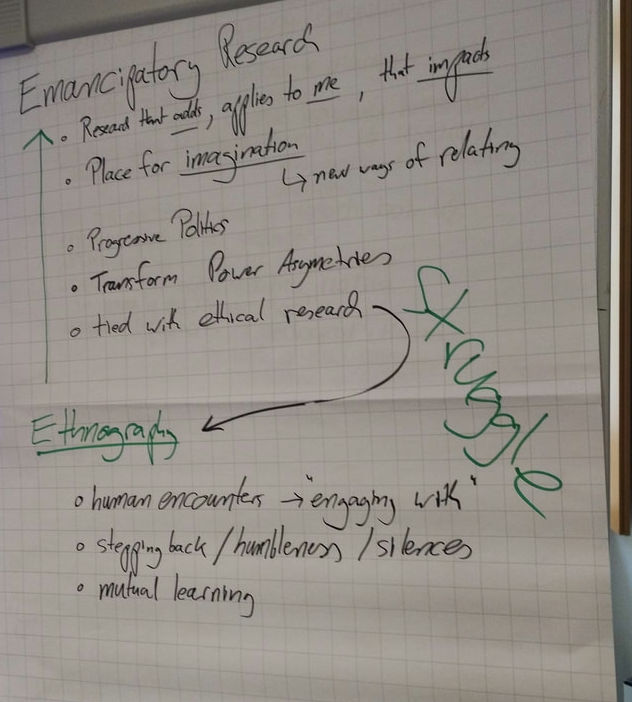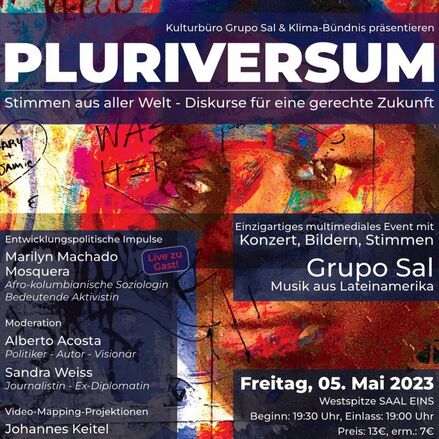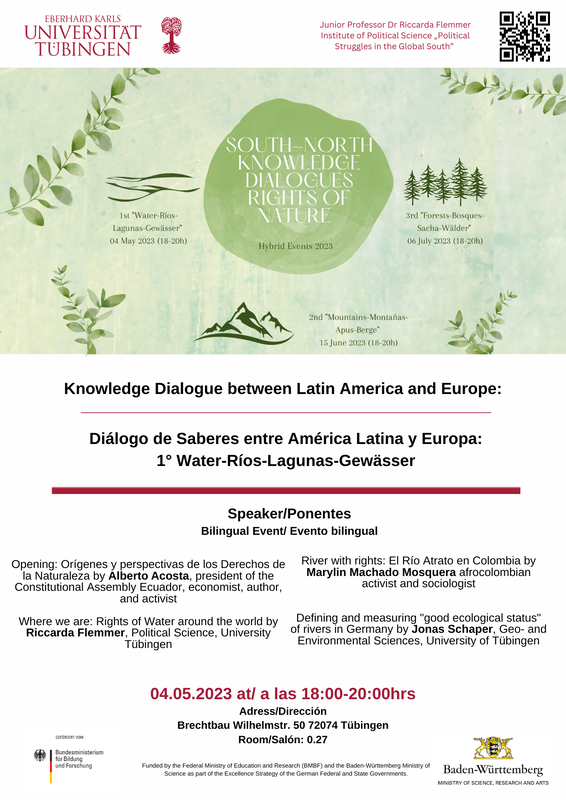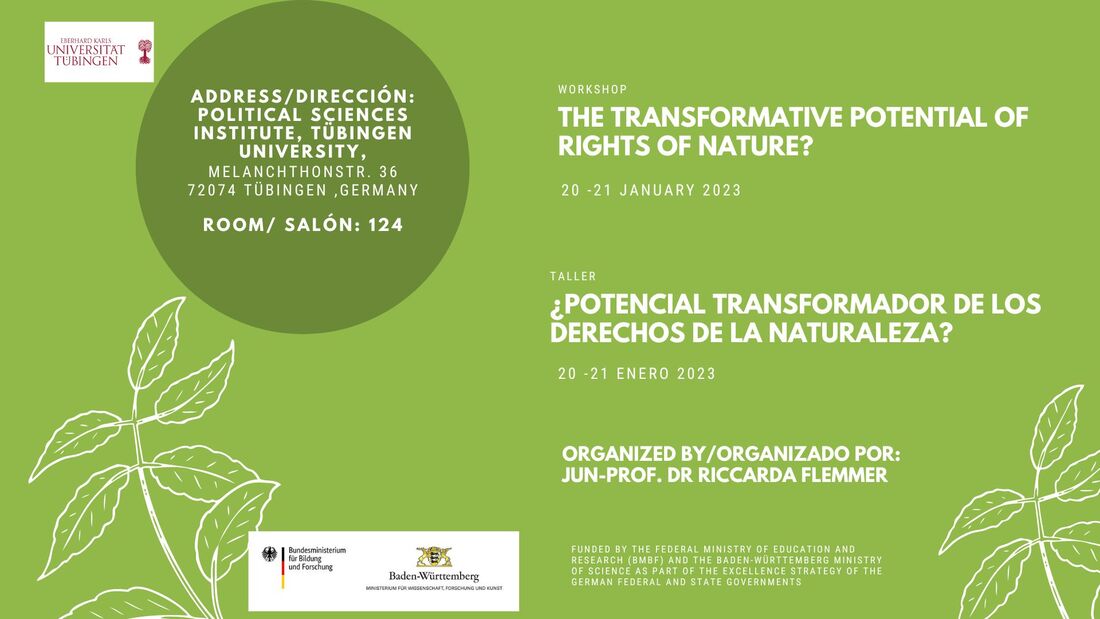|
With collaboration from: Verena Gresz - Doctoral Student and Research Fellow Micha Bröckling - Research Assistant Lina Weber - Research Assistant The ongoing climate catastrophe and biodiversity loss have led to renewed attention to alternative conceptions of human-nature relationships. Politically, the notion of rights of nature has been at the forefront of rethinking humanity’s connection with nature. Starting in Latin America, more and more natural entities have been awarded legal personhood to protect them against anthropocentric exploitation. These cases challenge established patterns of conceptualising nature and humans as separate entities in law and leave us wondering: How can a dialogue between humans and nature be established? How can individual and collective interests of humans and non-humans be mediated?
The Workshop To approach these questions, the ensemble of the Theatre of the Anthropocene engaged in a dialogue with students of the Arts-Based Research (ABR) seminar taught by Jun-Prof Dr Riccarda Flemmer and Verena Gresz this winter semester at the University of Tübingen. Together with other researchers at the University, we engaged in a cross-disciplinary workshop to discuss the potential and pitfalls of alliances between science and art. The exchange brought to the fore how scientific data can inform artistic practices about the issues of our time, such as the climate crisis and the protection from environmental destruction. Further, it also demonstrated how creative - and in this case performative - engagement with academic topics is capable of opening up a range of new perspectives for learning, teaching, and co-generating knowledge through more diverse, pluralistic, and - after all - fun didactics. Theatre Performance In “Lawyers of Nature”, the cross-disciplinary dialogue moved from the seminar room to the stage. The evening's host, Carrie Getman de Agudo, together with Kevin Mooney, guided the audience on an arboreal trip through the past, present, and future of the rights of nature. Every stop on this tour offered a novel and unique perspective on the guiding question of how to connect nature, human, and the law: a 1988 lawyer made the case for awarding Northsea seals legal personhood to sue the German state, a furious philosopher, Karl Christian Friedrich Krause, argued for his foresight in predicting the detrimental effects of anthropocentrism, and a futuristic mediator tried to find common ground between the different interests of the Spree river, politicians, and the locals. The fast pace of the play and its humorous tone gripped the audience's attention, provoked reflection and laughter alike, and made the evening a deeply memorable experience. The performance took place in cooperation with the University of Tübingen, Riccarda Flemmer Professorship "Political Struggles in the Global South". It was funded as part of the Excellence Strategy of the German federal and state governments.
0 Comments
Written by: Jun.-Prof.Dr. Riccarda Flemmer With colaboration from: Micha Bröckling- Research Assistant Lina Weber-Research Assitant The Event
On 19 October 2023, we co-organised the book launch of the German edition of "Pluriverse - A Post-development Dictionary" which brought together political and academic voices from the Global South and North with musical performances and artistic video projections. This interplay between music, projections and political impulses allowed the pluriversal message to be experienced through all senses. The launch was embedded into Grupo Sal’s Tour Program "PLURIVERSUM- DISCOURSES FOR A JUST WORLD" which created an immersive event. The sextet with singer Fernando Dias Costa carried the audience through the event with Latin American rhythm, poetry, and playful musicality. The event was moderated by Alberto Acosta, former President of the Ecuadorian Constitutional Assembly, together with journalist and ex-diplomat Sandra Weiss who led through the event with the virtual presence of guest activists from all over the world. Video-mapping projections from artist Johannes Keitel transformed the stage into a visual pluriverse. The projections included - always thematically contextualizing - performances, portraits, videos, photos, graphics, and quotes. The Book In "PLURIVERSUM - Ein Lexikon des Guten Lebens für alle" (link to free PDF and for book orders), more than 120 authors present diverse economic, socio-political, cultural and ecological concepts, worldviews, and practices from around the world. "Post-Development" questions the prevailing Western development model and presents alternatives that protect and respect life on Earth: A Pluriverse of Many Possible Worlds, encompassing a variety of system critiques and ways of living. This encyclopedia aims to re-politicise the ongoing debate on socio-ecological transformation by highlighting its multi-layered nature. The first English edition was published in India and has already been translated into French, Italian, Portuguese, and Spanish, with other languages to follow. For the first time, the German edition makes this diversity of alternative lifestyles accessible to German-speaking readers as well. The book is an encyclopedia with short articles on key concepts. It can be used for teaching and research, to educate activists, academics and practitioners, to inspire the curious to take action - and can inspire those in power to new ideas. This book was made possible by the commitment and unpaid collaboration of many as initiators, translators, proofreaders and proofreaders. Furthermore, thanks to a dedicated fundraising campaign to finance a large part of the production costs, this book can be distributed at a reasonable price. [Reupload] Written by: Jun.-Prof.Dr. Riccarda Flemmer Project: "The Transformative Potential of Rights of Nature?"/ “El potencial transformador de los derechos de la naturaleza? With colaboration from: Micha Bröckling- Research Assistant Mariana Contreras Leal- Research Assistant Lina Weber-Research Assitant The Knowledge Dialogues between Latin America and Europe in the summer term 2023 aim to bring together activists, indigenous peoples, practitioners, and scientists in a critical dialogue between the advocates and adversaries of Rights of Nature (RoN). The events will shed light on different topic areas, such as constitutional reforms, forest protection, global political transformation, and moral implications reflecting on the potentials and pitfalls of RoN for sustainable transformations. The series of dialogues is organized by Junior-Pprofessor Dr. Riccarda Flemmer and seeks to create a space for dialogue, mutual learning, and conjoint knowledge-production between the Global North and South.
Biocentric vs. Anthropocentric law-making In the third knowledge dialogue focus was set on the rights of forests. On 6th July 2023, Riccarda Flemmer opened the event by presenting the “International Rights of Nature Tribunal” as a civil forum where e.g. the rights of Amazonia have been claimed with the goal to put pressure on governments and prosecute violations of the RoN violations. She also outlined the cases listed by the Eco Jurisprudence Monitor about forests. The 17 listed cases are diverse in terms of their geographical location (1 Benin, 1 Canada, 8 Ecuador, 1 India, 1 New Zealand, 1 US, and 3 International) as well as in their biocentric or anthropocentric argumentations. Historically, claims for the legal standing of forests can be traced back to legal writings by US lawyer Christopher Stone’s “Should Trees have standing” and the dissent of Supreme Court Justice Douglas to the ruling Sierra Club v. Morton concerning parts of the Sequoia National Forest in 1972. Beginning in the 2010s, several forests were recognized then as “legal subjects”, e.g. the Te Urewera forest in Aotearoa/New Zealand 2017. In Latin America, the Colombian Supreme Court of Justice in a 2018 case declared the Colombian Amazonia a “legal entity subject to rights” in response to a climate litigation case articulated by young Columbians for their right to have a future. In Europe, the EU decided in the 2020 Resolution on Reversing Deforestation (P9_TA(2020)0285) about the protection of forests in order to restore their biodiversity and articulated that “ancient and primary forests should be considered and protected as global commons and that their ecosystems should be granted a legal status.” Worldwide the highest number of forest rights cases are located in Ecuador. On the one hand, these comprise indigenous claims for the national and international recognition of kawsak sacha (living forest in Kichwa) as a living and conscious entity with rights and intrinsic value. On the other hand, Ecuadorian courts recently ruled in favor of forests and stopped mining projects, for example in the “Los Cedros” case 2021. Los Cedros - How could a forest stop a mine? Elisa Levy from the OMASNE “Observatorio Minero, Ambiental y Social del Norte de Ecuador” (Observatory for mining, environment and social of Northern Ecuador) connected the case of Los Cedros in Ecuador with forests worldwide. She explained that it is necessary to protect forests because they are essential for the planet’s climate and for providing humans with ecosystem services (ESS). For instance, forests serve as water source and guarantee stable rain for the farmers in the Northern regions of Ecuador, who do not have irrigation systems. She summarized, ‘The bigger the forest, the better the ecosystem services it can provide’. Despite Ecuador’s adoption of RoN in their 2008 constitution, there have been guaranteed several mining concessions in or around the country’s highly biodiverse forests. One of the recent campaigns of OMASNE together with communities, scientists and other allies is the Los Cedros case. After five years of sustained protest and litigation, Los Cedros was finally recognized by the Ecuadorian Constitutional Court to have legal subjecthood including the right to exist with all its species and the right to maintain its cycles of life, structures, functions, and evolutionary process in 2021. Although the case set an important precedent, the Court does not always decide in favor of RoN in new cases. Practices of forest-making – what can we learn from Amazonian women and kawsak sacha, the living forest? Dr. Andrea Sempertegui, Assistant Professor in Politics at Whitman College presented parts of her research on Amazonian women’s practice of forest-making in Ecuador. In October 2013, women from different Amazonian indigenous peoples conducted the “March for life” walking from the lowland rainforest to the country’s capital Quito in the Andes in order to fight for the continuity of their way of life according to the principles of sumak kawsay (good living) and kawsak sacha (living forest). The living forest should be understood as a form of relationship which is not about conservation, but about interrelatedness between humans and non-human beings and highlights the acts of working for the continuation of the existence of nature. It is based on an egalitarian relationship. In this march and in the following protest activities, practices of engaging with the forest, e.g. chants and rituals, were performed in political arenas outside of the communities creating space to make coexistence with the forest known. She warned that despite officially having recognized RoN in its constitution, people and especially indigenous women need to fight for the recognition of understandings of living with nature. Though, it is important to highlight that all communities have their own terms and framings. They actively decided to combine their struggles using the Kichwa terms not to describe one single way of life but a plurality. Culture is nature, Science Theater Frank Raddatz, director of the "Theatre of the Anthropocene" in Berlin, bridged the gap between theoretical considerations and artistic practice in dealing with RoN and forests. In his plays, he said, everything is different from what we are used to know. A scientist is on the stage to be an actor talking about climate change; trees, rivers, and mountains are brought to life, and the whole audience plays along - to give just a small idea of how a performance can look like. Culture, he says, has a central part in our existence as human beings, and since we humans must see ourselves as part of nature again, culture thus is also something natural. Furthermore, a relation should be built between "hard science" and art. The conditions under which we exist in the age of the Anthropocene can only be understood, if we assume that we can only perceive and grasp nature through our culturally shaped filter. As the Theater of the Anthropocene exemplifies, we need to think in teams and to enter into dialogue between different disciplines. This kind of interactive theater creates a new sensibility, Frank argues, that enables us to imagine the future or alternative futures, in plural. Principles over law? Anarchist perspectives on RoN Ende Gelände Tübingen gave a talk about anarchist perspectives on rights for forests and RoN in general. In their view, responsibility is needed instead of leadership and democracy needs to be understood more radically - as a negotiation of living together without concentrated power but with shared responsibilities. Arguing for responsibility instead of rules, they highlighted that principles would be more important than laws, and that legal proceedings would always be infused and ultimately corrupted by state interests. They emphasized their main concern is that legislation takes something out of democracy and makes it less accessible and certainly less direct. The fear is that RoN might again only focus on human interests and that including nature into a law only operates as another way of making nature controllable to exploit it for the benefits of a particular elite. However, they support the idea of a forest owning itself and to expropriate nature from private owners. Despite the possible subjecthood, which nature could achieve by legal standing, RoN still operates within the given law system that is based on power hierarchies and exclusion. Plenary discussion In the plenary, the question emerged, how forest-making could be defined and how specifically those practices make the forest come alive while others do not. Andrea explained that “making alive” still entails a subject-object divide between humans and nature. She argued that we need to change our perception towards “doing something” to enable relations and make those tangible. For the anarchist perspective, Ende Gelände was asked, considering their criticism of RoN and legal systems, how their utopia would look and what relationships with forests would this utopia include. The activists explained that they would see RoN based on a biocentric understanding where humans and non-human beings have rights and value. Furthermore, according to their understanding, a system change is necessary because in the current commercial ways of using the earth, there is no space to even think about a future. With the audience, the question was discussed, how to change asymmetric and unjust human-nature relationships. While some emphasized the need to change our way of thinking in order to act differently, others urged that the material reality of economic injustices is the basis for current environmental destruction and climate change, therefore, this would need to change first . Synergies of knowledge The speakers agreed that it should be up to those who live in and around a forest to speak for it and make political decisions. The close relation with the forest and sometimes the dependence of human livelihoods would provide experiences on how the future of living with the forest should look. The idea of kawsak sacha would be a helpful tool to understand that forests are living entities and that humans need to know about as well as to acknowledge the flows in ecosystems, lifecycles, and regenerative systems. Humans and forests are connected, we can feel the relation with and the life of the forest if we let ourselves do so. Science can also play a role in knowing more about these relations. This, it will be essential to steer aways from the Global North’s human-centered law and policy making moving towards more respectful human-nature relations . Further questions to be discussed:
For more information about the series: "Knowledge Dialogues between Latin America and Europe about Rights of Nature" click here. Dialogues between Latin America and Europe about Rights of Nature 2° Mountains-Montañas-Apus-Berge4/7/2023 Written by: Jun.-Prof.Dr. Riccarda Flemmer |
|



